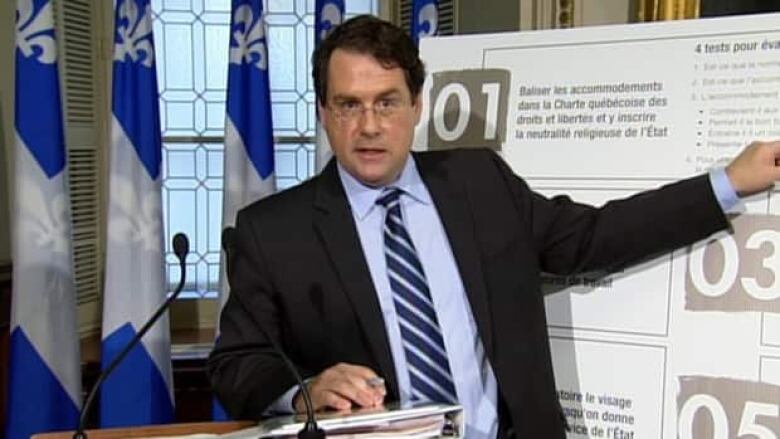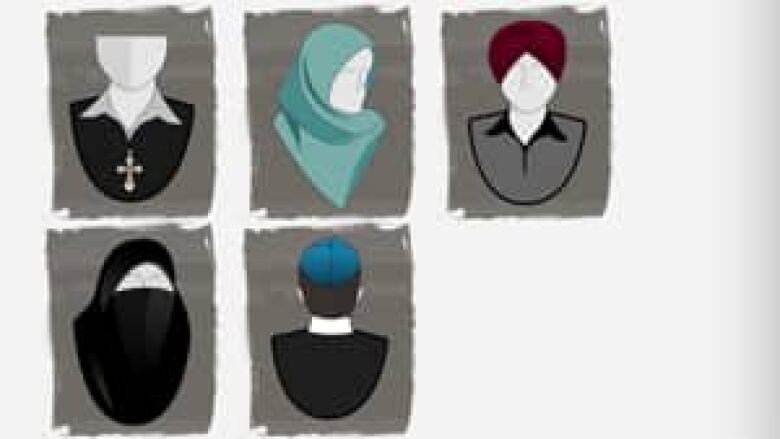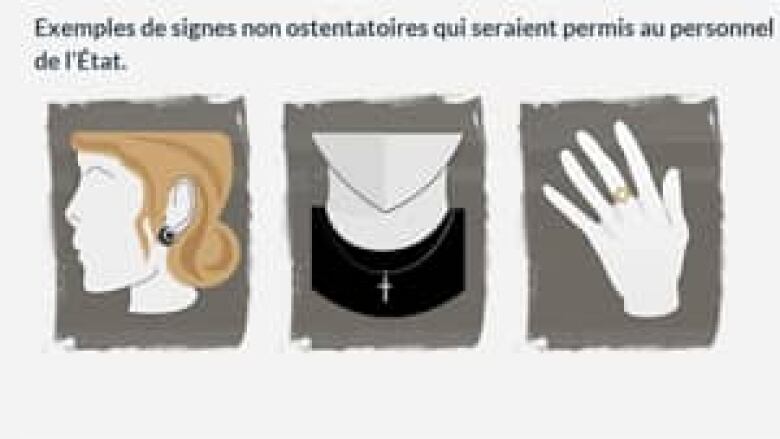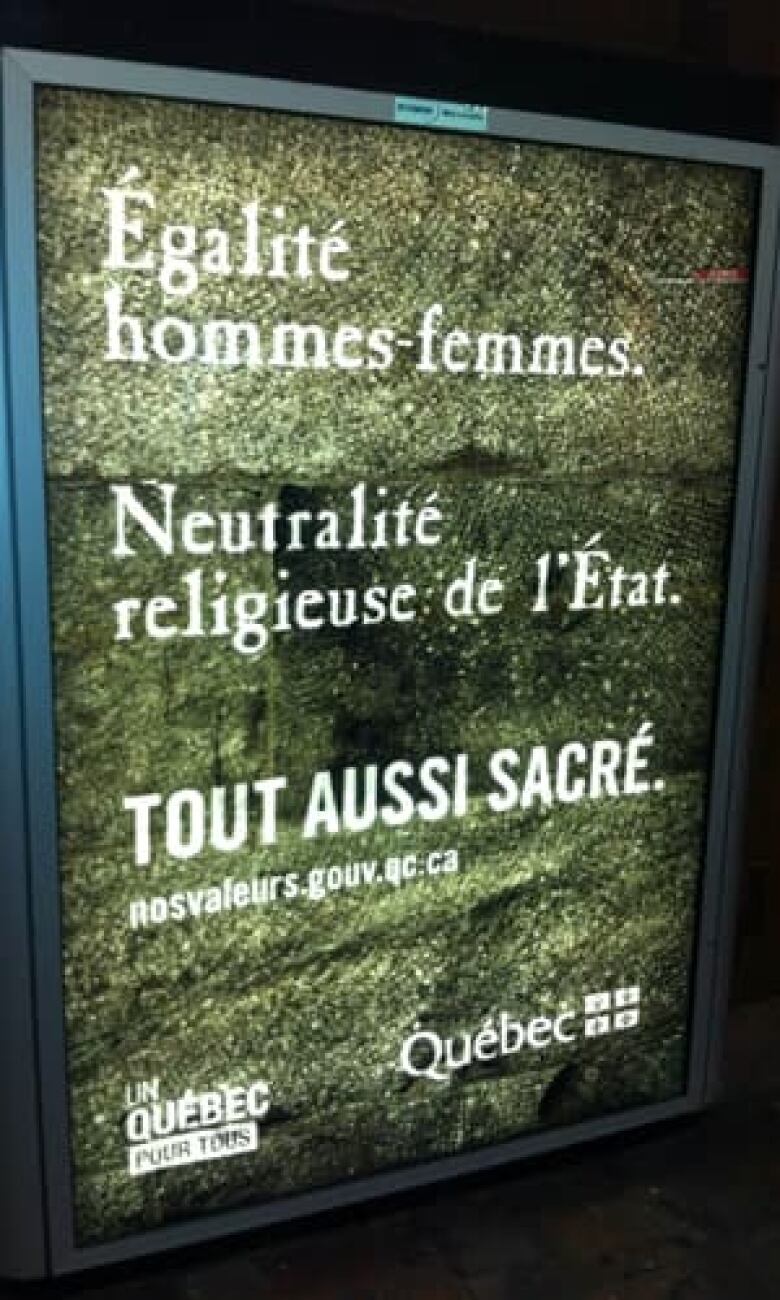Charter of Quebec values would ban religious symbols for public workers
Anyone giving or receiving public services would need face uncovered

Public employees would not be allowed to wearovert religious symbols at work under the proposed charter of Quebec values, released by the Parti Qubcois today.


Theminister in charge of the charter,Bernard Drainville,announced at the national assemblythatifthe charterwereadopted by the legislature, the wearing of kippas, turbans, burkas, hijabs and "large" crosses would be banned for civil servants while they are on the job.
- DEBATE: The politics of Quebec's charter of values
- Montreal's Radio Noon: most callers opposed to charter
- 5 things Quebec's values charter would do, and 5 it wouldn't
"If the state is neutral, those working for the state should be equally neutral in their image," said Drainville.
The plan would apply to judges, police, prosecutors, public daycare workers, teachers, school employees, hospital workers and municipal personnel.
Drainville said some institutions and public organizations might be able to opt outof the ban for a five-year period.
However, he said,daycare workers, elementary school teachers and early-care providers would not be eligible for the opt-out.
The charter would also require that anyone who received or administers services from the statewould have touncover theirface.
"People have to be identifiable, mainly for security purposes," said Drainville.
The charter would include five proposals:
- Amend the Quebec Charter of Human Rights and Freedoms.
- Establish a duty of neutrality and reserve for all state personnel.
- Limit the wearing of conspicuous religious symbols.
- Make it mandatory to have ones face uncovered when providing or receiving a state service.
- Establish an implementation policy for state organizations.
Drainville said elected members of the national assembly will not be subject to the regulations.
Though no timeline has been announced, the bill is expected to be tabled sometime in the coming months.
Creating trouble, Liberals and NDP say
Federal Liberal Party Leader Justin Trudeau said this afternoon that Premier PaulineMarois is trying to create tension between the federal and provincial governmentswith the proposed charter.
"Madame Marois has a plan. She has an agenda. Shes trying to play divisive identity politics because it seems to be the only thing that is able to distract from the serious economic challenges that were facing as a province and as a country," Trudeau said.
"But Quebecers and Canadians are better than that."
He said he expects Quebecers to push back against the proposed charter.
Last week, provincial Liberal Leader Philippe Couillard told CBC News the PQ was purposely trying to create trouble in Quebec.
"It creates division and Im afraid this is the objective here," he said.
NDP leader and Montreal MP Tom Mulcair said in August that he doubted the PQ could pull off a proposal such as this one.
At the time, he compared the proposed ban on religious symbols to Marois musing last year about requiring language tests for candidates in municipal elections.
"And I said, look, it's so patently unconstitutional they'll never do it. And guess what? It was so patently unconstitutional, they never did it," Mulcair said.
When asked this afternoon about his position now that the PQ had formally announced its charter, he said thathe would fight it.
"Last year, I remember being asked to react when Madame Marois mused, in time for the provincial election, about having language tests to run in a municipal election. Of course it was absurd and I said they'd never do it. And guess what? It was absurd, it was illegal, unconsitutional and, of course, they never did it, but she provoked the reaction she wanted," Mulcair said.
"She was sending a signala low frequency signal to her base."
He said there was chronic, systemic discrimination in the province, and that it was "intolerable" and "unbelievable"to him that a woman who wears a headscarf and who works as an educator could lose her job.
PQ needs other parties' support
Asa minority government, the partyneeds the support of some of its opponents to pass any legislation tied to the proposed charter.
But members of opposing parties have expressed deep concern about the language the PQ has used to explain the charter.
The premierhas been under fire ever since those details were leaked in August.
On the defensive, Marois has tried to explain why the charters aim at religious symbols in public institutions and the workplace was important to the PQ and to the province.
She told the French-language newspaperLe Devoir in an interview that people in England had turned to violence because the country lacked a sense of identity.
Maroisalso said women who wore hijabs and who worked in daycares could be in a position to incite children to practise religion.
Poll suggests growing support
An online poll released today suggests public support is growing for the charter in Quebec.
The survey conducted by SOM, one of the largest survey firms in Quebec, pegs support for a secular charter that would ban religious symbols for public employees at 66 per cent.
A poll conducted two weeks ago by Lger Marketing for le Journal de Montral found support to be 58 per cent.
And the PQ is already moving to garner public support. CBC News reporter Sean Henrysaw ads promoting the charter in the Montreal Metro on Tuesday afternoon.
The side-by-side French-language adsread "Church. Synagogue. Mosque. Sacred." and "Equality among men and women.Religious neutrality of the state. Also sacred."














_(720p).jpg)


 OFFICIAL HD MUSIC VIDEO.jpg)
.jpg)



























































































